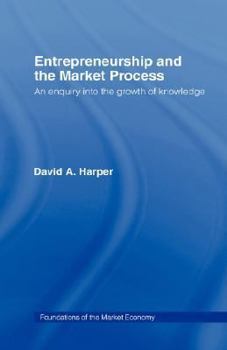Entrepreneurship and the Market Process: An Enquiry into the Growth of Knowledge
Select Format
Select Condition 
Book Overview
Enterpreneurship is central to the market process, and yet most theories of it fail to tackle the problem of how economic agents learn from their experience. This book redresses this by systematically... This description may be from another edition of this product.
Format:Hardcover
Language:English
ISBN:0415130484
ISBN13:9780415130486
Release Date:December 1995
Publisher:Routledge
Length:428 Pages
Weight:1.25 lbs.
Dimensions:1.5" x 5.7" x 8.7"
Customer Reviews
1 rating
Learning theory applied to entrepreneurship
Published by Thriftbooks.com User , 23 years ago
In contrast to theories of entrepreneurs which portray them as heroic figures, omniscient clairvoyants, or lucky fools, Harper argues that, like all humans, entrepreneurs can learn from their experience. They make reasonable conjectures, observe what happens, and then revise the theories and assumptions that led to the conjecture. Some are very good at this, but many -- probably most -- are not. Consequently, any theory of entrepreneurship must address the pervasive phenomenon of entrepreneurial failure and losses. The book is based on Harper's dissertation. Unlike most such books which are prematurely published, before their authors' ideas had time to mature, this book reflects the enormous amount of work Harper put into reviewing the relevant literature in economics (his field), psychology, philosophy, and other fields. Harper's intellectual mentor is Karl Popper, and he does an excellent job in summarizing Popper's ideas and applying them to the entrepreneurial problem: learning in the face of vast uncertainty. This is NOT a book for practicing enterpreneurs, but rather for people interested in theories of entrepreneurship. Harper's perspective represents a welcome challenge to the "instrumentalist" and "entrepreneurial alertness" views that now enjoy wide currency. It is a major contribution to the emerging evolutionary view of entreprenership.






